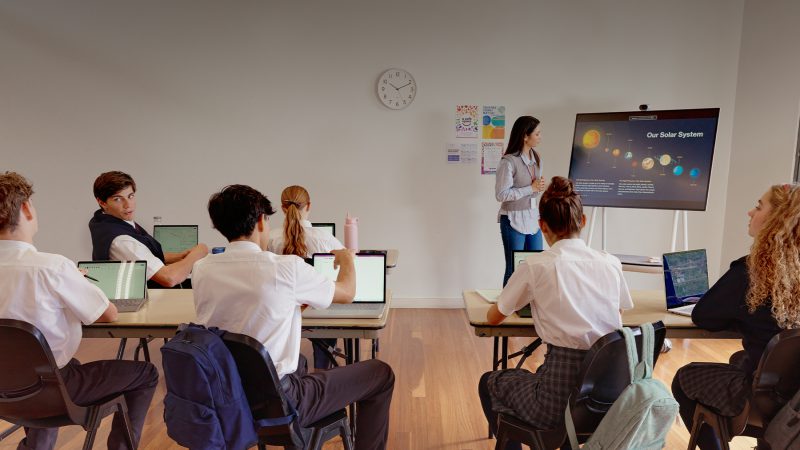
Catholic Education Canberra & Goulburn transforms lives with Catalyst professional learning

With the goal of transforming lives through learning, Catholic Education in the Archdiocese of Canberra and Goulburn (CECG), embarked on a journey to implement and embed high impact teaching practice in every classroom. In January 2021 CECG launched a system-wide professional learning program, known as Catalyst, for the 2,500 teachers working in 56 Catholic schools across the Archdiocese of Canberra & Goulburn.
The Catalyst Program
The Catalyst Program, CECG’s major learning and teaching initiative supports all 56 schools and focusses on two ‘bold goals’ – for every student to be a competent reader, and for high impact teaching practices to be visible in every classroom. To achieve these goals, CECG determined teacher professional learning in three key areas – curriculum, pedagogy, and assessment.
Historically, teacher professional learning was a face-to-face proposition, managed by individuals or by their schools. Catalyst offers online, highly focused, accredited professional learning, supported by rich and curated content, delivered in Microsoft Teams, which allows teachers from across the system to put into practice what they have learned when they return to the classroom.
Catalyst programs are accessed online through Microsoft Teams and SharePoint and bring together all the resources teachers require into a single location, at their fingertips.
Trazel Scott, a Senior Officer in the Teaching and Learning team at CECG, played an integral role in the team with the definition, implementation and launch of the Catalyst program, including co developing and co-managing the online learning platform.
As she notes; “There isn’t a teacher out there that doesn’t want to do the best for their children,” and that includes undertaking high impact professional learning.
Rather than leave individual schools or teachers to navigate the professional learning landscape on their own, the Archdiocese has done “the heavy lifting to provide a set of high impact teaching resources, quality lessons, professional learning in the Science of Reading and the Science of Learning and provided access to internationally recognised speakers and educators,” says Scott.
Giving all teachers access to the best possible professional learning goes beyond quality content, “It has to resonate,” says Scott, who working with the Teaching and Learning team at CECG, have ensured that the platform is structured to take account of cognitive load theory and ensuring that the system investment into Microsoft Teams and the teacher experience reflects state of the art thinking regarding the Science of Reading and the Science of Learning.
“We are trying to tap into the best professional learning that we can,” she adds – stressing that the same content and access needed to be available to every teacher – whether they were working in a Canberra College or were a kindergarten teacher in Lake Cargelligo, five hours’ drive away.”
We’re elevating existing evidence and shaping that into a program of professional learning that targets making great teachers even better.
CECG said enlisting the help of specialist partners in change management, communications and marketing, educational excellence, event management and evaluation contributed to the program’s success in 2021. Through hosting milestone events, creating a visual identity and a key message platform, principals and teachers were easily able to identify Catalyst programs and materials, and understand its key features and benefits.

Catalyst in practice
Merici College, a 7-12 girls’ school in Canberra, has been participating in Catalyst in 2021 as part of the System’s 56 Schools.
Renee Taylor, Assistant Principal says the College was excited by Catalyst’s “Strong focus on teacher pedagogy to improve literacy and numeracy in our students, particularly around the bold goals,” and its system-wide approach which opens the door to increased collaboration between schools as well as primary and secondary teachers.
After our first system day in January the staff were just buzzing…this focuses on what good quality teaching looks like and the heart of what we do with kids.
“We had a large group of teachers participate in the High Impact Teaching Practice Professional Learning– across all departments of the school, this served to engage our teachers positively knowing they were participating with colleagues from across the system. When we did the Science of Learning Online Unit in MS Teams which focused on cognitive load theory, there were so many light bulbs that went off for teachers – such as ‘I really need to be careful of how I am constructing my test papers, how I am constructing my activity work sheets – the manner I am designing’, as that can have a significant effect on student’s ability to engage with material and learn,” she says.
Assessment data, progressive achievement test (PAT) data on spelling, reading, maths, as well as student surveys at Merici reveal that Catalyst has had a significant impact. “Regardless of age level, when you look at the bottom tier of learners, this has really brought up the bottom, has shifted the middle, and has extended a little bit the top – but not as far as we would like yet,” says Taylor.
Merici has used Catalyst learning programs to train teachers in reading intervention and will train staff in 2022 in The Writing Revolution.
We have a multi-pronged approach, so no student falls through the gaps; we tailor to individual student needs.
How teachers engage with Catalyst
Catalyst’s professional learning online units are stored on SharePoint and accessed through Teams. The units are designed to be offered during a staff meeting and last for around 45 minutes – but are also available for individual teachers to review when it suits them. The units are supported by quizzes so that the Archdiocese can keep track of progress and each of the units has been accredited with the ACT Teacher Quality Institute and NSW Education Standards Authority.
Schools can access curated reading lists through Catalyst, submit videos of their practice to engage in virtual coaching through the Microsoft Teams platform. After completing Catalyst High Impact Teaching Practice professional learning, teachers can record themselves applying the learning in a classroom setting, upload that to Teams, and have a coaching feedback session.
The Archdiocese is now exploring how it could use Teams to foster inter-school collaboration where teachers who have completed various Catalyst learning, share their classroom experience and resources. The SharePoint based curriculum hub is being used by teachers with the aim of enabling future cross school collaboration particularly for Mathematics and English, says Scott.
The Catalyst team are also keen to understand how Viva Learning, part of Microsoft’s Viva employee experience platform, could be used by teachers. The Viva Learning app is in Teams and offers a central hub where people can share, recommend, and learn from content libraries.
In 2022 the Archdiocese plans to work with Deloitte Access Economics and the Australian Education Research Organisation (AERO) to assess the impact of Catalyst and develop mechanisms that will allow the Diocese to monitor the program’s ongoing impact.
Categorised in: Education, Industry
This post was written by Microsoft Australia









